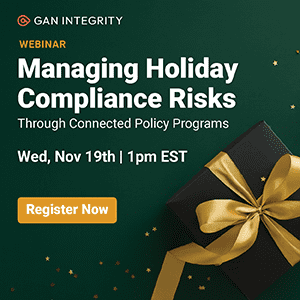After issuing guidance in April that leaned against recording most COVID-19 cases, OSHA has now walked back that guidance somewhat. Husch Blackwell’s Avi Meyerstein discusses the new guidance on recording your employee’s case of COVID-19.
As COVID-19 spread widely through communities around the country, it immediately presented a challenge for employers. OSHA’s recordkeeping and reporting regulations require employers to record (and sometimes report) occupational illnesses. Normally, this means gathering facts about an employee’s exposure to illness and making a determination about whether it was more likely than not caused by an exposure to the illness at work. But, with COVID-19, someone could become infected anywhere.
Husch Blackwell safety and health attorneys wrote to OSHA early on, asking for a presumption that COVID-19 infections were not work-related since they could come from anywhere. Shortly thereafter, OSHA adopted our recommended approach. Under OSHA’s April guidance, only health care, emergency response and correctional employers had to continue doing the usual analysis to determine work-relatedness for each case. Everyone else only had to record a COVID-19 case if reasonably available objective evidence indicated that the infection occurred at work.
However, OSHA has now walked this back in a new enforcement memo, retracting much of its April decision.
What do I have to do now?
As of May 26, 2020, OSHA emphasizes that all employers covered by the recordkeeping regulations must investigate an employee’s confirmed case of COVID-19 and treat the case as work-related if it was “more likely than not” the result of workplace exposure (the usual rule). OSHA says it will still use discretion when investigating a failure to record or report. The guidance implies that OSHA will be understanding and may go easy on employers who can show that they made a reasonable investigation and a reasonable determination based on evidence available.
What is a reasonable investigation?
OSHA says that employers, “especially small employers,” do not have to perform “extensive medical inquiries.” In most cases, when an employer learns that an employee is infected, OSHA’s guidance suggests that it should be enough to:
- Ask the employee: How do you believe you became infected?
- While respecting employee privacy, discuss with the employee the activities both at work and outside work that may have led to the infection. Outside exposures could include community gatherings, family illness, school, shopping, recreational sports, bars and dining out, mass transit, etc.
- Review the employee’s work environment for potential exposures (such as close contact – within six feet – with other employees, visitors or the public, considering especially any contact with people suspected or known to have had COVID-19).
- Consider documenting your investigation, at least in broad terms (while respecting employee privacy considerations). OSHA’s memo does not require documentation, but it is probably a good idea in light of OSHA’s renewed potential enforcement so you can show that you made a good faith investigation and a reasonable determination with the information then available.
When is a case of COVID-19 work-related/recordable?
OSHA did not entirely walk back its prior guidance. It still recognizes the limitations and challenges facing employers in determining work-relatedness, and it is still using language that leans toward only recording when the available evidence suggests a workplace exposure (plus meeting other recording criteria).
Ultimately, OSHA says that a case is only work-related if you determine that it is more likely than not that the employee’s exposure to COVID-19 in the workplace “played a causal role” in becoming infected. If you cannot determine a more-likely-than-not workplace cause of the illness, you do not need to record the case.
Determining Recordability of COVID-19 Cases*
- Confirm the infection. Does the employee have a confirmed case of COVID-19 based on a positive test result?
-> If NO, you do not a confirmed illness to record/report. Your inquiry is complete.
-> If YES, proceed to the next step. - Investigate. Conduct a reasonable, good faith investigation (see above for detail).
a. Ask the employee: How do you believe you became infected?
b. Interview the employee about possible sources of exposure at work and outside work.
c. Review potential sources of workplace exposure. - Weigh evidence. Compare the information you obtain about how the employee may have been exposed to the virus at work vs. possible exposures outside work.
- Make a determination. Was exposure at work “more likely than not” the cause of the employee’s infection?
-> If NO, the case is not work-related and not recordable. Your inquiry is complete.
-> If YES, the case is work-related. To determine whether to record, proceed to the next step. - Confirm other general recording criteria. Does the case meet the general recording criteria of the recordkeeping standard?
-> If YES, the case is recordable.
-> If NO, the case is not recordable.
Questions?
All of this may be easier said than done. While OSHA still appears to hint to employers that they will be safe if they act “reasonably,” no doubt the revised guidance will cause some more complication. The prior guidance let many employers off the hook from making the usual inquiry about work-relatedness for COVID-19. Most employers will now have to not only make careful inquiries but also weigh various facts to try to determine if the exposure more likely than not occurred at work.
*If OSHA recording normally applies to your company. There are some exemptions for certain industries and small companies in 1904.1 and 1904.2.



 Avi Meyerstein is a Washington, D.C.-based partner with the law firm
Avi Meyerstein is a Washington, D.C.-based partner with the law firm 








